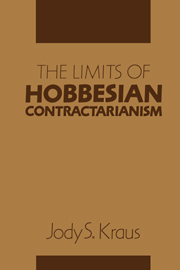3 - Hampton's internal solution: a dilemma
Published online by Cambridge University Press: 05 June 2012
Summary
Hampton's theory provides a prominent role for the demonstration of the existence of an internal solution to the state-of-nature problem. As we have seen in Chapter 2, two central claims turn on this demonstration. When combined with the inferential argument, it is supposed to prove that (1) some political association is, for us, individually rational to create and maintain, and (2) political association is individually rational for us to create and maintain if and only if it is collectively rational. In this chapter, my aim is to show that Hampton's contractarian argument either fails by its own terms to justify political authority, or succeeds at the cost of legitimizing regimes which are clearly pretheoretically illegitimate, even by the lights of those who advocate a reduction of morality to rationality. I waive the previous criticisms of Hobbes's motivation for the reduction of morality to rationality and the objections to the inferential argument. The central problem with Hampton's contractarianism, I will argue, is that it presupposes a reduction of morality to individual rationality and takes into account collective rationality only indirectly when collective and individual rationality merge. The reduction of morality to individual rationality has led contractarians to focus their energy on the problem of demonstrating the individual rationality of creating political institutions in the state of nature. This problem has vexed philosophers who blame the prisoner's dilemma for the conflict and noncooperation of the state of nature.
- Type
- Chapter
- Information
- The Limits of Hobbesian Contractarianism , pp. 104 - 183Publisher: Cambridge University PressPrint publication year: 1993



